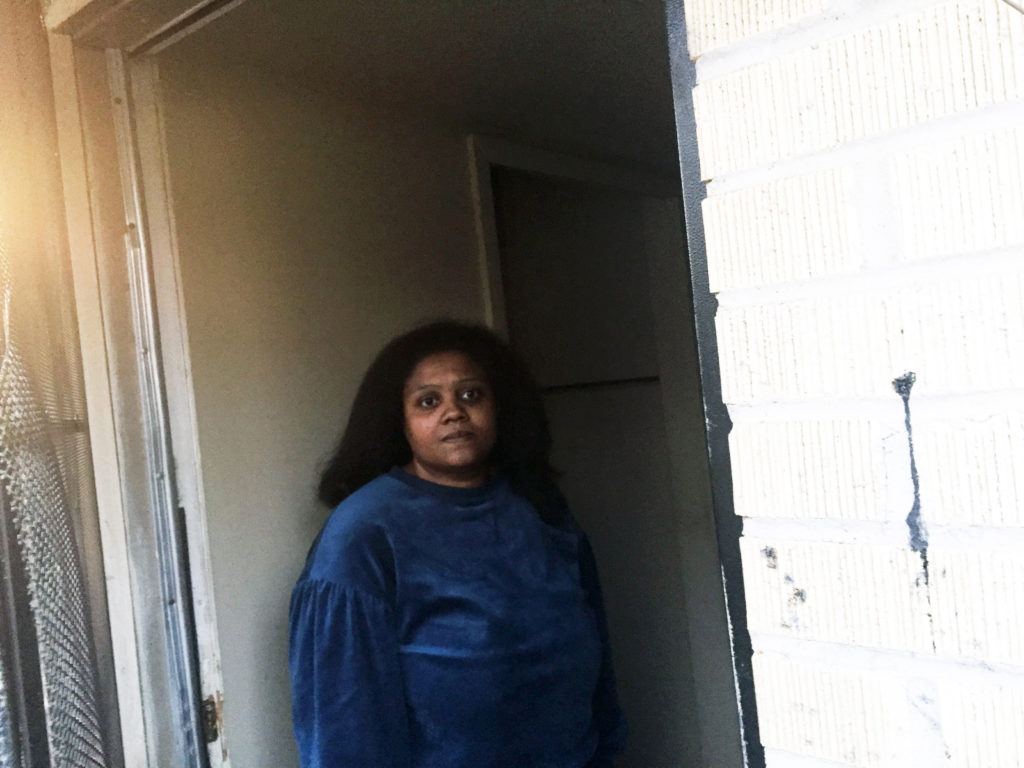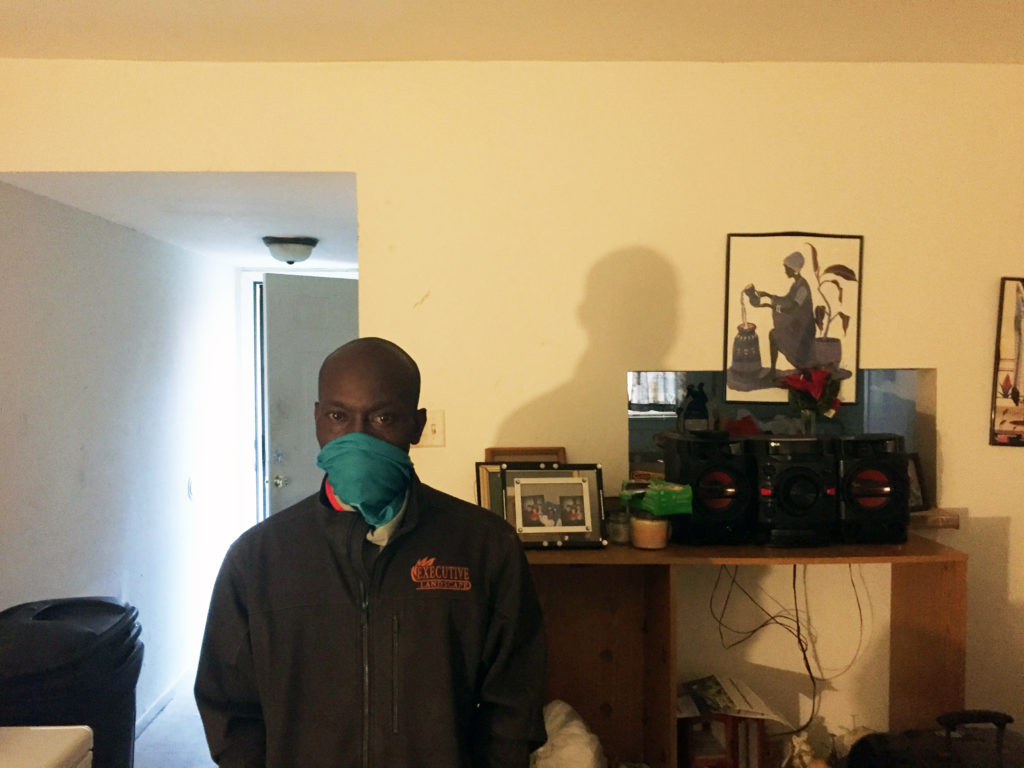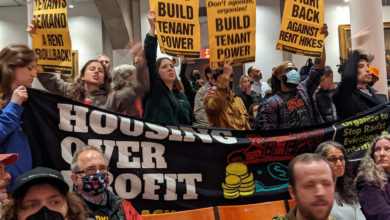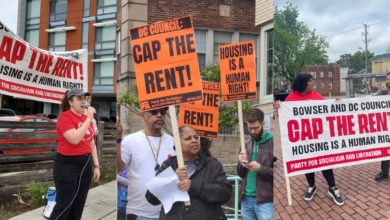Despite the evictions already occurring in Mississippi and all over the country, Congress did not vote to extend the moratorium beyond March 31 in the newest stimulus bill. At this moment a new moratorium is uncertain, but past experience shows that the moratorium has not been much help here.
The problems Mississippi’s renters were facing existed before the pandemic. Robert Wilson, a tenant in Greenwood, Mississippi, said: “When COVID came about, it’s like another layer adding to the issues people are already going through in this country. So now people are having to struggle even harder to make ends meet.” Mississippi ranks eighth among all 50 states for evictions, and the state’s capital, Jackson, ranked fifth among cities in 2016.
Pandemic makes Mississippi’s housing problem worse
Unemployment skyrocketed during the pandemic. Through 2020, 114 million people lost their jobs — that’s $3.7 trillion in lost income, and that means a lot of lost rent. Andrea, a renter in Jackson, was working at the Hilton before she lost her job in the pandemic. “Like I said, in this pandemic ain’t hardly nobody working, [people are] mostly on unemployment. Some people ain’t join unemployment so they can’t do nothing,” she told Liberation News.
Robert Wilson was among those who could not get on unemployment. “Last May, my job was furloughed for a week or so, which delayed my paycheck for a week. So that affected how I was paying my rent.” But that was not the end of it. “Later on in August, I had caught COVID. When I caught COVID, I was off of work the entire month of August and my rent was behind two months in because I was behind on going to work to make money. And also with Mississippi unemployment, it was hard for me to get unemployment at that time because there were so many layers and steps I had to go through to get approved for it.”
Another renter in Jackson, who wished to stay anonymous, said he was taken off of food stamps during the pandemic, and has not been able to get them for 4 months. “My rent goes up $200, they stop my food stamps, a lot of people lost their job, more people getting food stamps now. So there’s a shortage of food stamps. Some people don’t get none. I missed that point. Every time I call, they don’t answer the phone. All I get is a recording.”
Andrea Griffin is another renter who finds it hard to find work in the pandemic. “Jobs that are easily accessible such as substituting, or filling in, or even contracting, they’re not available anymore. Say for instance, in this community I could just walk here, walk right across the street, walk down the street, that’s not available anymore.”

In Mississippi, unemployment is still a very thin band-aid. The weekly unemployment benefits are less than the federal minimum wage at $235 a week. For many it is not enough to cover rent and bills. Andrea’s boyfriend, who is on unemployment, will have to start back paying rent after the moratorium ends at the end of March. “That’s supposed to be his whole check. So yeah, we starting to be struggling.”
For many, the safety net is not even enough to keep a roof over their heads. The anonymous tenant said, “Rent is unaffordable in all 50 states now. Rent is going up nationwide. That’s why you got all these homeless people. They used to work. The director of the Stewpot told me, a lot of people who are homeless get a check, they get disability, they get a retirement check. The rent so high they can’t afford it. Because by the time they pay their rent, they ain’t got nothing to live on, they can’t pay their bills, so they’re homeless. By the time the check comes, they’re living on the streets because rent is so high. You find yourself homeless, because your check is not keeping up with cost of living.”
No strong safety net for Mississippi’s renters
The federal moratorium has not been helping renters in Mississippi, who have very little in the way of rent relief. Jackson had more evictions filed during the moratorium than in 2016. During the moratorium, landlords were filing evictions of 13 families a day compared to roughly 7 in 2016. Even though in-person court was ruled too risky, through digital court landlords still used warrants of removal to evict 200 Jackson tenants.
Why were there so many evictions during a national moratorium? This is because the moratorium has many loopholes for landlords and landlord-partial judges to exploit. First of all, the Center for Disease Control itself states that the moratorium is not legally binding. This means that landlords can evict with impunity. Additionally, many tenants do not even know that a moratorium is in place, so they do not even have the knowledge or paperwork to invoke the moratorium to their landlord or a judge. The moratorium’s extensive requirements for its invocation also give judges broad power to dismiss it on its own grounds. This stipulation is so broad in interpretation that a judge can rule in favor of an eviction even if a tenant invokes the moratorium.
One of the few programs that was in place to help Mississippi’s renters was the Rental Assistance in Mississippi Program, which is administered by the Mississippi Homes Corporation. Even though only $3 million of the $18 million in funds allocated to assist Mississippi’s renters were spent, the program was discontinued. Mississippi Homes Corporation claims this is because the moratorium is in effect, so people who would qualify are not at risk of homelessness and therefore do not qualify for RAMP funding.
This has left many renters without any assistance. Tenant Erica Merchant had to adapt to the pandemic while raising a baby. “It’s been hard. At the beginning I couldn’t work after I had him, so money was very short.” Later she was able to find work. “Although, you know, it’s still not the same pay because it’s still not the same amount of hours.” Merchant feels that there could be more programs to assist single mothers.
Shune Brown, a tenant and landscaper in Jackson, spoke to the lack of assistance, saying: “I think it really sucks. We going through a pandemic, people dying, the government should step its hand up. Just like they’re mismanaging money, like the water structure right now. But the government, they’re lining their pockets. As long as they sit fat, it’s all right, fuck the poor people. You talking about putting people out, you got people out here homeless. The government doing what they can but, see, they ain’t doing enough for the community.”

Moratorium extension stalls as it is challenged in the courts
The CDC is likely to extend the moratorium, but they sent their proposal less than two weeks before the current moratorium expires on March 31. For renters living paycheck to paycheck, with color-coded slips on their doors with notices about thousands of dollars in late rents, this extension has come at short notice. The future of the CDC moratorium is even more uncertain since it was not included in the newest stimulus bill in Congress, but extended by the CDC itself with the support of then-president Donald Trump. Democrats in Congress failed to strengthen the moratorium by extending it in the stimulus bill and renters will have to pay the price.
On March 15, U.S. District Judge Mark Norris ruled in favor of making the CDC moratorium virtually unenforceable in Memphis and East Tennessee. This came after landlords sued federal agencies such as the Department of Housing and Urban Development, the Justice Department, Center for Disease Control, and Human Services. According to the judge, CDC cannot extend an order without it being in any congressional legislation. If an extension of the moratorium was not legislated by Congress then the CDC, according to the judge, has no power to extend the order. For renters, this is a scary precedent. Since neither the current moratorium, nor the potential extension, were passed through Congress, this means it could be ruled unconstitutional.
As in Tennessee, many of the judges are partial to landlords in Mississippi. As stated before, they often rule in favor of evicting tenants in eviction courts. Landlords in Mississippi have already had the power to evict without impunity in Mississippi. If they get any more power to evict, that means more renters being evicted in the middle of a pandemic. More renters getting evicted means an increase in COVID cases according to a recent study. This is a public health emergency.
Mississippians must oppose all evictions by any means necessary on the grounds of public health for renters and all Mississippians. The authority of landlords to evict and judges’ power to rule in favor of evictions must be challenged. The CDC, Congress, Governor Tate Reeves, the Mississippi legislature, mayors, city councils, and rent relief providers are playing with the lives of renters who struggle every day to keep a roof over their heads.
Mississippi’s renters demand relief
In the midst of the lack of assistance for renters during the pandemic, many renters feel left behind and demand more. “They [the government] should understand some of them can’t pay nothing, but if they can pay something they should be satisfied with that. They shouldn’t get kicked out or nothing,” said Andrea. “They [the government] know how this stuff is, and some of the jobs aren’t even hiring back.” Despite this, landlords are still putting notes on the doors of tenants demanding back rent with the threat of court.
Ashley Washington, a tenant in Jackson, feels cheated by the government, which she sees as inadequate to deal with the crisis: “They should pay the rent. Rent shouldn’t be nothing to them but pennies [to the government].” Washington is correct. The Pentagon is already proposing a budget of $704 billion to the Biden administration for military spending. During the pandemic, billionaires saw their wealth increase by more than $1 trillion and their collective net worth reaching $4 trillion. The issue is not a lack of money on the part of the CEOs and the government that serves them, but a lack of initiative from these sectors of society. This is why we need a mass movement against evictions and against the institution of privatized housing itself, with strong demands.
For Mississippi, the immediate demands are for President Joe Biden to cancel all rents and mortgages; for The Mississippi Homes Corporation to release all CARES ACT funds to tenants, or for the Mississippi State Legislature to make the Homes Corporation release these funds if necessary; and for municipalities to issue a moratorium on all evictions. Municipalities must also house the house-less, people escaping abuse, people living in unsafe housing, and anyone else living in a precarious living situation.
These immediate demands are only a band-aid on the existing crisis of privatized housing. But what will fix this problem?
Socialist housing in Mississippi?
The root of the problem in Mississippi, and all over the United States, is private housing. The people who live in apartment complexes, trailer parks, or rented-out houses do not actually own the buildings in which they live. That is why renters have to deal with repairs that never happen, increased vigilance from private security, and being thrown out during a pandemic from an eviction or even something as arbitrary as the end of a lease.
In order for there to be just housing in Mississippi, the power of landlords must be broken. In order for everyone to be housed, the immense wealth that has been amassed by corporations during this pandemic must be used to fund housing for all. This can only be done through a government run by the people, for the people. In order for this to happen, the people must struggle for just housing.
Feature image: Andrea, a renter in Jackson who lost her job at the Hilton during the pandemic. Liberation photo.




